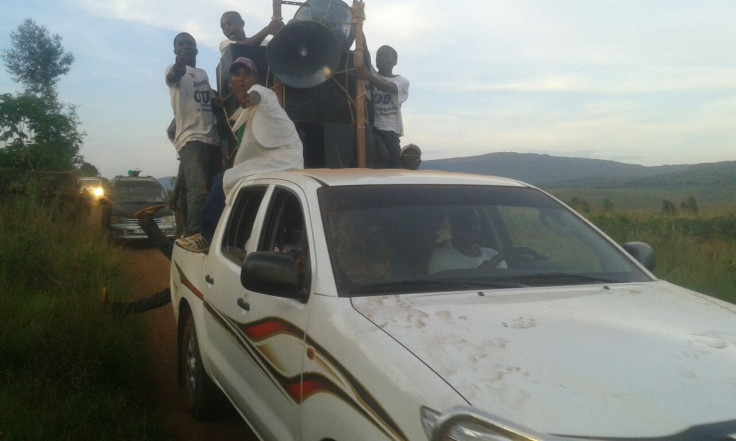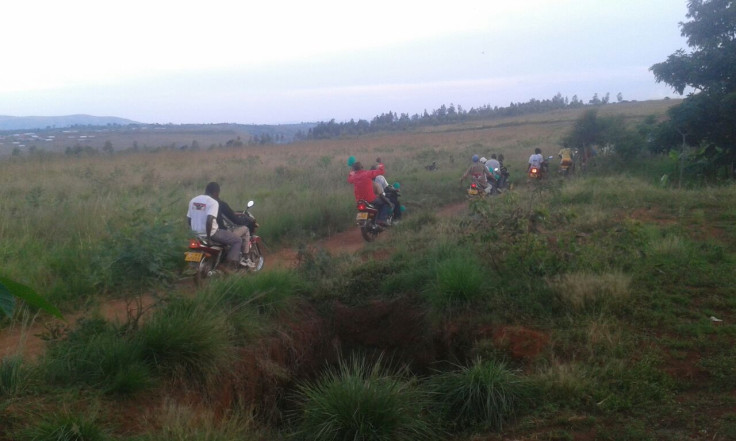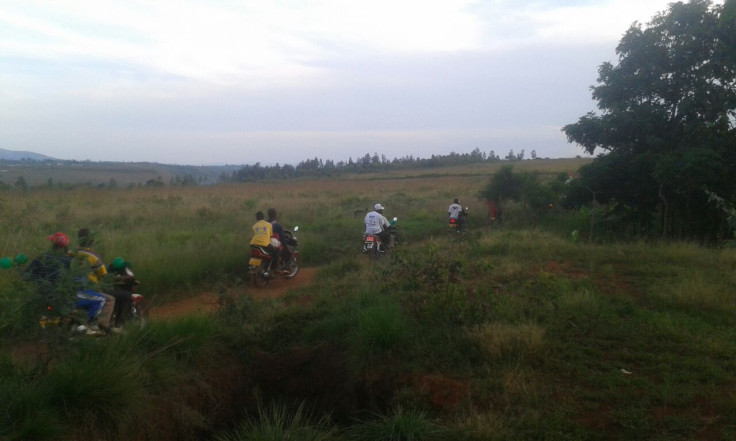Burundi: Imbonerakure youth militia wages intimidation campaign against Tutsi refugees

Tutsi refugees from Burundi claim they have become victims of a campaign of intimidation and violence orchestrated by members of the Imbonerakure, the youth wing of the country's ruling party, to help President Pierre Nkurunziza win a controversial third term in the 26 June election.
Under the president's CNDD-FDD party umbrella, the Imbonerakure (the Kirundi word for "those who see far") was formed in 2010 and is made up of disarmed fighters from the ruling party's military wing that started out as a rebel force and never fully demobilised. Many of its members maintained a fighting mindset.
The most recent ethnic crises in Burundi occurred in 1993 and 1996, when 300,000 people were killed in a civil war between ethnic Hutus and Tutsis.
Burundian Tutsis, who have been living in the Bugendana refugee camp in the centre of the country after surviving the massacre of Bugendana where some 600 people were killed on 20 July 1996, told IBTimes UK they were threatened by a throng of 40 Imbonerakure on Thursday (21 May).
Terrifying slogans
Claude, a refugee who uses an alias to protect his identity, explained how a "normal propaganda visit" by members of the Imbonerakure and the administrator of the refugee camp turned sour after the youths threatened the displaced people.
"I was at home and heard a group of Imbonerakure – around 40 on motorbikes accompanied by three Jeep vehicles full of people and the administrator's Toyota – who had come to do their electoral propaganda activities for the CNDD-FDD," Claude said.
While it is not unusual for the group to gather at the perimeter of the refugee camp, which is not under the UN refugee agency's jurisdiction, Claude said on this occasion, the Imbonerakure had also started to sing a chilling chant.

"The abnormal thing was their slogans, Tuzobamesa [We are going to wash you] and N'ubu Nkambere [Now like in the past], referring to the 1993 and 1995-96 crises, which led us [Tutsis] to find refuge in the current site," he said.
When residents of the camp reacted to the slogans, witnesses say the Imbonerakure performed a throat-slitting gesture.
"They were showing they were going to cut your head off, with a finger on their throat. That really saddened people in the camp. That reminded us of the past, the massacres of 1993 and 1996 and the sociopolitical crises of 1993 to 2004," Claude said.
The assault comes less than a week after the armed group allegedly surrounded the 3,600-member Tutsi refugee camp on the night of 15 May and threatened to kill refugees, as revealed by IBTimes UK.
On 26 May, Zeid Ra'ad Al Hussein, the United Nations High Commissioner for Human Rights, declared he was concerned by the behaviour of the Imbonerakure.
"During my visit to Burundi last month, I was alarmed by the violence of the Imbonerakure militia, one of the main supporters of the government of President Nkurunziza, and the political harassment, threats and hate speech," he told the UN Council of Human Rights in Geneva, Switzerland.
'Nothing will happen to refugees'
However, in a speech to the nation earlier in May, Nkurunziza asked for better security in and around the country's refugee camps.
The president's adviser, Willy Nyamitwe, said the government is "trying its best" to avoid stumbling into another ethnic war.
"Those who try to manipulate the information try to compare the Imbonerakure to the Rwandan militia Interahamwe [a Hutu militia that committed the genocide in Rwanda]," Nyamitwe told IBTimes UK, highlighting the fact that the Imbonerakure is made up of multi-ethnical youths representing the country's Hutu, Tutsi and Twa populations.
Nyamitwe claimed people who speak about the Imbonerakure "are also falling into a trap of making generalisations because an Imbonerakure is a member of the youth league of the CNDD-FDD – a club both the president and I belonged to in our youth".

"We have moved beyond the ethnic sensitivities," he said over the phone on 27 May. "Those who are using the ethnic raw nerve are the protesters who are organising demonstrations in neighbourhoods with a Tutsi majority, to have the Hutus believe Tutsis are the ones protesting. However, even if the protests happen in Tutsi neighbourhoods, Hutus are also taking part in the demonstrations."
Asked about claims that the Imbonerakure had threatened refugees, the adviser said the president would condemn "those who use these slogans and condemn those who exploit their meaning indiscriminately", adding he "would like to tell those people who fear [the Imbonerakure] that nothing will happen to them".
Tuzobamesa and N'ubu Nkambere are not official CNDD-FDD slogans, the adviser said, adding these expressions "were used by over-zealous people, who claim that whatever happens, the CNDD-FDD will win".
According to Nyamitwe, words can mean many different things. "Tuzobamesa doesn't necessarily mean 'We'll kill you', but means 'We'll conquer you – in the elections'," he said, adding people singing the slogans were not necessarily affiliated to the CNDD-FDD party.
Fleeing the intimidation
Yet, many have decided to flee the country after what they consider to be growing campaigns of intimidation by the militia.
Patrick (not his real name) is one of them. He left the Mutaho camp, in Gitega province, after what he describes as "terrifying night-time visits" from members of the Imbonerakure, who he claims live within a kilometre of the camp.

"They come, do their propaganda every day. They sing menacing verses, sing their slogans. But I have decided to flee because I am a member of the executive committee of the Genocide Survivors Association, so I feel very targeted," he told IBTimes UK on 27 May from Kigali, Rwanda.
"Like all other Tutsi refugees living in the Mutaho camp, I have been accused of having danced and sung after the coup d'etat announcement, because the Minister of Defense Pontien Gaciyubwenge is Tutsi, and all Tutsis are said to be involved in the coup," Patrick said. "We have been accused of being involved in the coup, so fear of a potential genocide has taken over us. That's why I have decided to take off."
Patrick also described how his participation in independent radio shows where he would speak about the living condition endured by Tutsi survivors has made him a "political target".
"Here, at home, people see me as an opposition leader, they see me as someone who sullies the CNDD-FDD and my country because I post articles on Facebook. In the past, the local administrator also intimidated and menaced me – I was forbidden to come home when I was still a student – hence why I feel in danger today," he added.
But not every survivor decided to leave Burundi. For Claude, abandoning the country would mean bowing to the intimidation.
"I am sure to die because, even if there are threats, attacks and warrants from the secret services, I cannot flee the country. I grew up in the war. I will die for my country. I cannot escape now," he said. "That's life."
UNHCR, the UN refugee agency, said on 26 May that 72,618 people have fled Burundi in recent weeks, mainly to Rwanda, Tanzania and the Democratic Republic of Congo.
UPDATE:
(2:29pm 28 May) A meeting between the different political parties in the commune of Budengana was held on Thursday afternoon to discuss the recent attacks by the Imbonerakure.
The leader of Imbonerakure, Vincent Nbihoqubwo, told the Association of the Survivors of the Genocide of Bugendana that he would "hold his men".
Emmanuel, a leader of the association, told IBTimes UK that all political parties had agreed to work together.
© Copyright IBTimes 2025. All rights reserved.






















